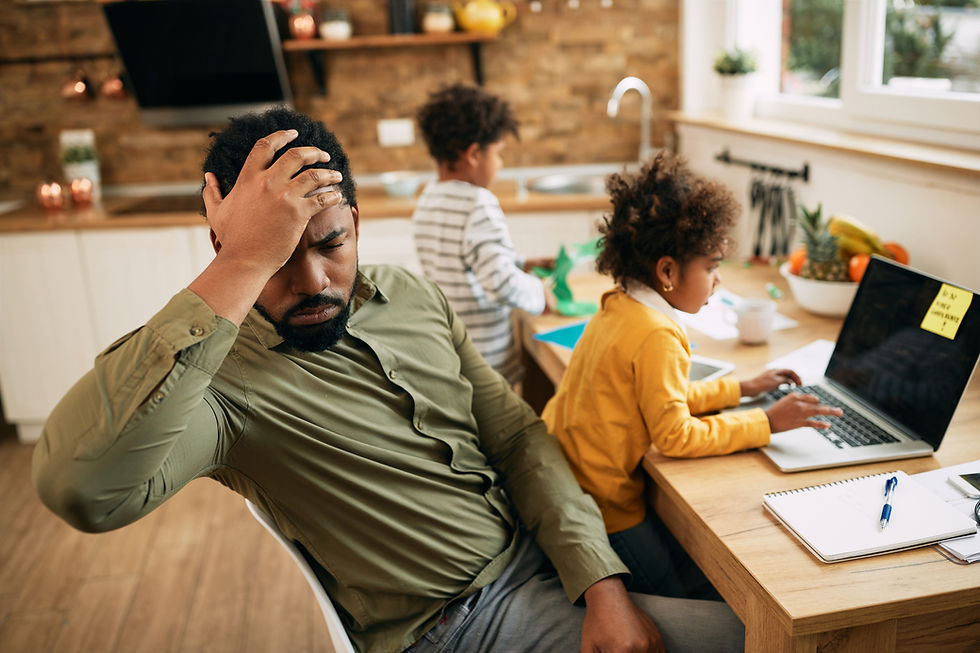Parental Burnout: Recognising the Signs and Recharging Your Mental Health
- Kimberly Freeman, BA.Psych, Dip.Couns, Registered Counsellor

- Apr 13, 2025
- 2 min read

Parenting is rewarding, but it can also be relentless. For many parents, especially those juggling work, home duties, and emotional load, exhaustion becomes the norm. When that tiredness goes beyond “just a hard week” and turns into chronic stress, you might be experiencing parental burnout.
What Is Parental Burnout?
Parental burnout is a state of physical, emotional, and mental exhaustion caused by prolonged parenting stress. It’s more than just being tired—it’s feeling overwhelmed, detached, and like you're no longer the parent you want to be.
A 2019 study by Mikolajczak et al. describes parental burnout as including four major symptoms:
Exhaustion related to one’s parental role
Emotional distancing from children
Loss of pleasure or fulfillment in parenting
Contrast with previous parental self—feeling like you've changed or no longer recognise yourself as a parent
This differs from general stress or depression. Parental burnout is specifically linked to the chronic stress of parenting—often made worse by isolation, lack of support, or perfectionist ideals.
The Mental Health Impact on Mums and Dads
Left unaddressed, parental burnout can significantly affect your mental health. You may feel guilty, anxious, or resentful. It can strain relationships, reduce patience with your children, and lead to emotional withdrawal.
Recent research shows that mental health for parents is closely tied to how supported and resourced they feel. When parents have no time to rest or recharge, their well-being suffers. Mums, in particular, often carry the mental load of household planning, emotional support, and caregiving—putting them at higher risk for burnout.
Common Signs You Might Be Experiencing Burnout

Feeling emotionally drained every day
Snapping at your kids over small things
Wanting to escape or fantasising about “quitting” parenting
Struggling to feel joy or connection with your children
Constant self-criticism or feeling like a “bad parent”
If these sound familiar, know that you're not alone—and that help is available.
Supporting Your Mental Health as a Parent
Self-care isn’t selfish—it’s essential. To prevent or recover from parental burnout, consider these strategies:
Reconnect with yourself: Take small windows of time to do something that fills your cup, whether that’s journaling, a walk in nature, or a hobby.
Reach out for support: Whether it’s your partner, a friend, or a counsellor, don’t go it alone. Talking to someone can provide relief and perspective.
Set boundaries: You can’t say yes to everything. It’s okay to lower expectations, ask for help, or say no.
Address the guilt: Parental guilt often fuels burnout. Acknowledge your feelings but challenge the inner critic—you're doing your best.
Seek professional help: A mental health professional can support you through burnout and help you rebuild a healthier emotional foundation.
Counselling Support for Parents Facing Burnout
If you're feeling overwhelmed and burnt out, counselling offers a safe space to breathe, reflect, and reset. Together, we can explore your stress, reconnect you to your values, and find practical ways to lighten the mental load.
You don’t have to do it all. You don’t have to do it perfectly. And you don’t have to do it alone.
References:
Mikolajczak, M., Gross, J. J., & Roskam, I. (2019). Parental Burnout: What Is It, and Why Does It Matter? Clinical Psychological Science.


Comments